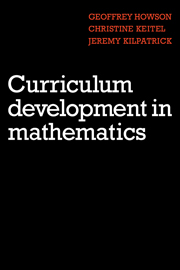Book contents
- Frontmatter
- Contents
- Preface
- 1 Curriculum development: an introduction
- 2 The historical background
- 3 Case studies of curriculum development
- 4 The practice and management of curriculum development
- 5 Curriculum theory and curriculum research
- 6 A retrospective look at curriculum projects
- 7 Evaluation within curriculum development
- 8 Lessons for today and tomorrow
- Appendix 1
- Appendix 2
- Bibliography
- Index
Preface
Published online by Cambridge University Press: 05 October 2010
- Frontmatter
- Contents
- Preface
- 1 Curriculum development: an introduction
- 2 The historical background
- 3 Case studies of curriculum development
- 4 The practice and management of curriculum development
- 5 Curriculum theory and curriculum research
- 6 A retrospective look at curriculum projects
- 7 Evaluation within curriculum development
- 8 Lessons for today and tomorrow
- Appendix 1
- Appendix 2
- Bibliography
- Index
Summary
During the 1960s and 1970s there were few, if any, countries which did not attempt radically to reform school mathematics curricula. This reform movement can, indeed, be viewed as the greatest experiment ever to take place within mathematics education. Of course, it was not conducted upon classical research lines: there were, in general, no control groups, hypotheses were often implicit, and evaluation, when it did take place, was frequently carried out in a haphazard manner. In the mid 1970s the curriculum development boom was to end almost as rapidly as it had begun.
What are the lessons to be learned from these two decades of frenzied activity? How can success be attained and mistakes avoided in the future? What, indeed, is the future for curriculum development?
These are key questions which mathematics educators everywhere must answer. We hope that this book will help them in their task. What we have attempted to do is to set curriculum development in mathematics in both a historical and a more general social and educational context. We have sought not only to give a descriptive account of developmental work, but also to go beyond mere description in an attempt to provide a theoretical base for criticism and analysis.
We hope that the book will prove of interest and value to all those engaged in mathematics education, for everyone should be aware of his responsibilities so far as development is concerned.
Information
- Type
- Chapter
- Information
- Curriculum Development in Mathematics , pp. vii - viiiPublisher: Cambridge University PressPrint publication year: 1981
